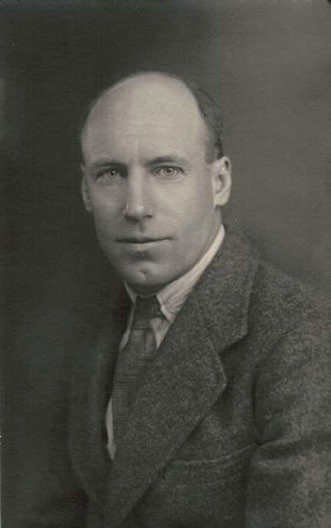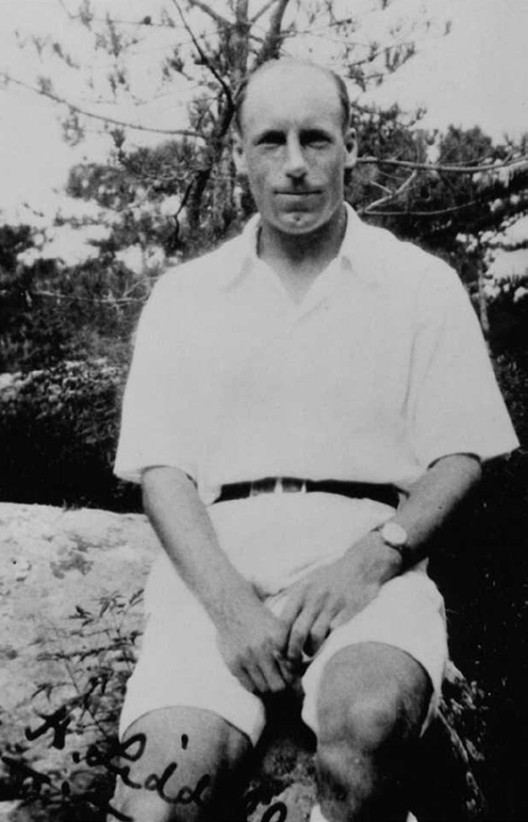Beyond Chariots of Fire
On the 100th anniversary of Eric Liddell’s famous victory in the 400 metres at the Paris Olympics, Jackie Macadam reflects on his life and legacy.
PICTURE the scene.
It is a warm morning in Paris, on July 6 1924. The Scots Kirk in Rue Bayard is full, the congregation eager to hear the guest preacher that day. When he stands to speak, he looks at them all and begins in a steady voice with a gentle Scottish burr.
If he could hear the excited crowds attending the athletics events of the Olympic Games happening elsewhere in the city, he gave no sign.
Yet no one would have been surprised if he had. The guest preacher that day was Eric Liddell, scholar, missionary, and extraordinary athlete, one of the favourites for the 100 metre sprint, a race whose heats were being contested that day in the giant stadium.
But Liddell, a devout man and one who held his Christian values dear to him, had refused to run in the heats of this, his favourite event, because they were to be held on the Sabbath, and the Sabbath was for the Glory of God, not personal gratification.
If Liddell’s life made him a hero then the Oscar-winning film, Chariots of Fire, centred around that race and his personal beliefs, made him a legend.
Liddell, born in China to Christian missionaries, was sent to Britain aged five to be educated. He was a bright child and one who was always active, dashing here and there, but also lost in moments of quiet contemplation.
“
If Liddell’s life made him a hero then the Oscar-winning film, Chariots of Fire, centred around that race and his personal beliefs, made him a legend.
It was when he went to Edinburgh University that his talents were really drawn out. He excelled at athletics and played rugby for Scotland’s national team seven times.
On July 11 Liddell lined up to run the 400 metres, one lap of the track, in Paris, and this time there were no clashes with the Sabbath.
The tall runner with a slightly strange, upright, running style, flew round the track and clinched the gold medal. Many wondered, if he had been a man who was less devout, what could have been.
Liddell himself, when asked some time afterwards whether he regretted his decision, simply replied: “It’s natural for a chap to think over all that sometimes, but I’m glad I’m at the work I’m engaged in now. A fellow’s life counts for far more at this than the other.”
But Liddell’s life, though defined by many as the Christian athlete who refused to run on a Sunday, counted for much, much more.
When he finished his studies at Edinburgh University, his BSc in Pure Science under his belt, Eric returned to China to become a missionary, like his parents before him. Eric returned to Scotland only twice more. In 1934 he married Florence MacKenzie and had three daughters, Patricia, Heather and Maureen. He did not live to meet Maureen.
In 1941 China had become so dangerous because of the threat from the Japanese, that British nationals were advised to leave.

Credit: The Eric Liddell Community
Florence, still pregnant with Maureen, and the other two children, left for Canada. Eric accepted a position with a rural mission station in Xiaozhang, where his brother, Robert, was a doctor. Robert was very ill, and needed to furlough, while Eric stayed on, doing what he could.
In 1943, he was interned at the Weihsien Internment Camp with other missionaries. In spite of the enormous hardships faced by them all, Eric maintained good humour and busied himself helping the elderly, teaching Bible class, and even science to some of the youngsters in the camp. A fellow internee, interviewed years later, said of Eric: “He was overflowing with good humour and love for life, and with enthusiasm and charm. It is rare indeed that a person has the good fortune to meet a saint, but he came as close to it as anyone I have ever known.” Eric died from an inoperable brain tumour on February 21 1945. The camp was liberated five months later.
His legacy, as a missionary in China is explored as part of the Eric Liddell 100 programme, (EL100) which aims to bring a greater understanding of this remarkable human being to a wider audience.
It is a partnership initiative designed to ‘create a global community that celebrates Eric Liddell’s inspirational legacy, values and integrity’.
They aim to acknowledge how his outlook shapes how we help people live full lives, to show a new generation how these aims can help them live their best lives, to build on existing links and relationships around the world, and to develop new sporting, business, cultural and educational relationships linked to his legacy.
Based on and spanning three different workstreams, ‘Educational, Physical and Sporting, and Cultural’, a huge amount of information collated by EL100 can be found on the extensive web pages they have made available.
They cover Eric’s life and work in detail, from his youth, his educational and sporting achievements and his missionary work in China.
John MacMillan, chief executive officer of the Eric Liddell Community, described how the impact of Liddell’s life deserved recognition in this centenary year.
“The Eric Liddell Community is a specialist care and dementia charity based in an area of Edinburgh where Eric Liddell lived and studied,” he explained. “Established in 1980, with the family’s support, the charity was named after Eric Liddell and since then has endeavoured to provide care and support within the community in line with his values.
“As CEO of a charity named after Eric Liddell, I felt that it was incumbent for us to not only celebrate the centenary but put in place lasting actions that, in addition to the fantastic work done every day by our charity, will help secure his legacy for future generations. In visiting schools and youth organisations to talk about the work of our charity, I was increasingly faced with the question of ‘Eric who’? Of course, the Oscar winning film Chariots of Fire which brought his story to so many, is now over 40 years old and unwatched by many young people.

Credit: The Eric Liddell Community
“Whilst the film focussed on Eric Liddell’s amazing sporting achievement, the lesser-known story of his life after the Olympics is perhaps even more remarkable. Throughout his life, Eric demonstrated the values of passion, compassion and integrity, and it is these values that we aim to promote through all of our work.
“We have been supported by a wide range of partners in developing a programme of activities and events that we hope will bring Eric’s story to life, inspire and educate in this important centenary year and beyond.”
And back in Paris, the centenary is also due to be marked.
A chance conversation between retired minister, the Rev Jim Patrick, and Kilsyth Burns and Old Parish Church elder, Thomas Chalmers, led to a celebration of Eric Liddell’s life and legacy in the Scots Kirk Paris.
Jim, a former Kilsythian, knows the Paris church and congregation very well, having been locum several times since retiring from his own church in Cape Town. Jim had been encouraging the Kirk Session in Paris to consider what they might do to mark the centenary locally, unaware of the preparations of John MacMillan and the Eric Liddell Community in Edinburgh.
When Jim was visiting his hometown of Kilsyth and catching up with Thomas, they were chatting about the centenary and Thomas mentioned that he had been introduced to John MacMillan. In that moment Jim and Thomas realised they could potentially connect the Edinburghbased charity with the Kirk in Paris, and link up directly.
“The result?” says Jim. “A special weekend at the Scots Kirk on July 6 and 7 where celebrations of Liddell’s life and devotion will be first and foremost.
“On Saturday July 6, there is a one-man play, Beyond the Chariots, relating the life of Eric Liddell after the Olympics; he went to China as a missionary and died there in 1945 as a Japanese prisoner of war.
“On Sunday July 7 there is to be a centenary service at which the Moderator of the General Assembly, the Rt Rev Dr Shaw Paterson, is due to attend and unveil a commemorative plaque.
“We may not have official saints in the Church of Scotland,” says Jim, “but we certainly have heroes of the Faith. Like Eric Liddell – a true icon and inspiration.”
Learn More about Eric Liddell 100 at https://ericliddell.org/the-eric-liddell-100/